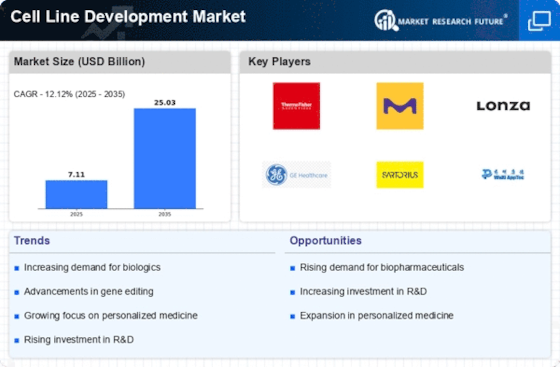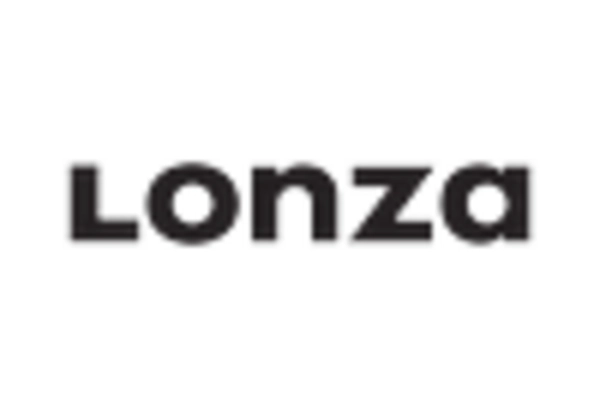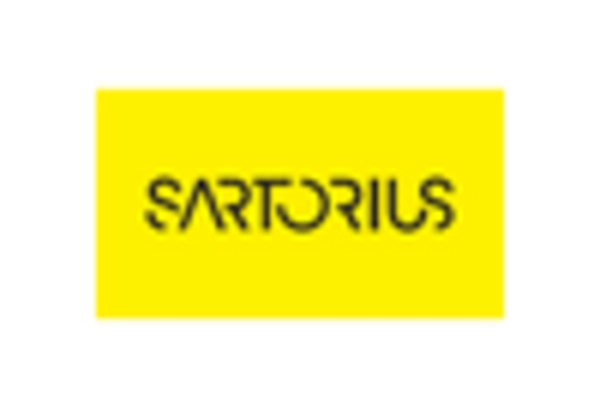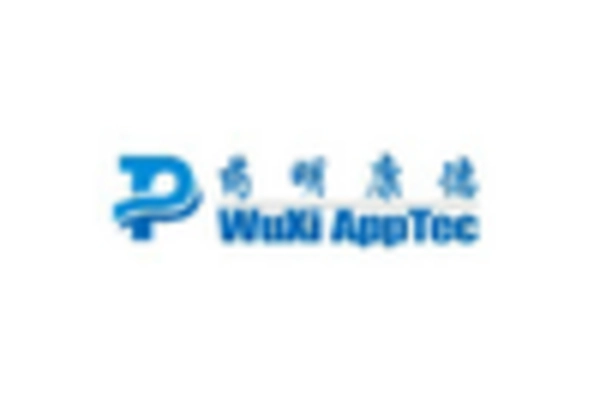Drug Discovery
Bioproduction
Toxicity Testing
Stem Cell Research
Genetic Engineering
Hybridoma Cell Lines
Recombinant Cell Lines
Continuous Cell Lines
Primary Cell Lines
Pharmaceutical Companies
Biotechnology Companies
Academic Research Institutions
Contract Research Organizations
Cell Line Development
Cell Line Banking
Characterization
Quality Control
North America
Europe
South America
Asia Pacific
Middle East and Africa
North America Outlook (USD Billion, 2019-2035)
North America Cell Line Development Market by Application Type
Drug Discovery
Bioproduction
Toxicity Testing
Stem Cell Research
Genetic Engineering
North America Cell Line Development Market by Type
Hybridoma Cell Lines
Recombinant Cell Lines
Continuous Cell Lines
Primary Cell Lines
North America Cell Line Development Market by End User Type
Pharmaceutical Companies
Biotechnology Companies
Academic Research Institutions
Contract Research Organizations
North America Cell Line Development Market by Process Type
Cell Line Development
Cell Line Banking
Characterization
Quality Control
North America Cell Line Development Market by Regional Type
US
Canada
US Outlook (USD Billion, 2019-2035)
US Cell Line Development Market by Application Type
Drug Discovery
Bioproduction
Toxicity Testing
Stem Cell Research
Genetic Engineering
US Cell Line Development Market by Type
Hybridoma Cell Lines
Recombinant Cell Lines
Continuous Cell Lines
Primary Cell Lines
US Cell Line Development Market by End User Type
Pharmaceutical Companies
Biotechnology Companies
Academic Research Institutions
Contract Research Organizations
US Cell Line Development Market by Process Type
Cell Line Development
Cell Line Banking
Characterization
Quality Control
CANADA Outlook (USD Billion, 2019-2035)
CANADA Cell Line Development Market by Application Type
Drug Discovery
Bioproduction
Toxicity Testing
Stem Cell Research
Genetic Engineering
CANADA Cell Line Development Market by Type
Hybridoma Cell Lines
Recombinant Cell Lines
Continuous Cell Lines
Primary Cell Lines
CANADA Cell Line Development Market by End User Type
Pharmaceutical Companies
Biotechnology Companies
Academic Research Institutions
Contract Research Organizations
CANADA Cell Line Development Market by Process Type
Cell Line Development
Cell Line Banking
Characterization
Quality Control
Europe Outlook (USD Billion, 2019-2035)
Europe Cell Line Development Market by Application Type
Drug Discovery
Bioproduction
Toxicity Testing
Stem Cell Research
Genetic Engineering
Europe Cell Line Development Market by Type
Hybridoma Cell Lines
Recombinant Cell Lines
Continuous Cell Lines
Primary Cell Lines
Europe Cell Line Development Market by End User Type
Pharmaceutical Companies
Biotechnology Companies
Academic Research Institutions
Contract Research Organizations
Europe Cell Line Development Market by Process Type
Cell Line Development
Cell Line Banking
Characterization
Quality Control
Europe Cell Line Development Market by Regional Type
Germany
UK
France
Russia
Italy
Spain
Rest of Europe
GERMANY Outlook (USD Billion, 2019-2035)
GERMANY Cell Line Development Market by Application Type
Drug Discovery
Bioproduction
Toxicity Testing
Stem Cell Research
Genetic Engineering
GERMANY Cell Line Development Market by Type
Hybridoma Cell Lines
Recombinant Cell Lines
Continuous Cell Lines
Primary Cell Lines
GERMANY Cell Line Development Market by End User Type
Pharmaceutical Companies
Biotechnology Companies
Academic Research Institutions
Contract Research Organizations
GERMANY Cell Line Development Market by Process Type
Cell Line Development
Cell Line Banking
Characterization
Quality Control
UK Outlook (USD Billion, 2019-2035)
UK Cell Line Development Market by Application Type
Drug Discovery
Bioproduction
Toxicity Testing
Stem Cell Research
Genetic Engineering
UK Cell Line Development Market by Type
Hybridoma Cell Lines
Recombinant Cell Lines
Continuous Cell Lines
Primary Cell Lines
UK Cell Line Development Market by End User Type
Pharmaceutical Companies
Biotechnology Companies
Academic Research Institutions
Contract Research Organizations
UK Cell Line Development Market by Process Type
Cell Line Development
Cell Line Banking
Characterization
Quality Control
FRANCE Outlook (USD Billion, 2019-2035)
FRANCE Cell Line Development Market by Application Type
Drug Discovery
Bioproduction
Toxicity Testing
Stem Cell Research
Genetic Engineering
FRANCE Cell Line Development Market by Type
Hybridoma Cell Lines
Recombinant Cell Lines
Continuous Cell Lines
Primary Cell Lines
FRANCE Cell Line Development Market by End User Type
Pharmaceutical Companies
Biotechnology Companies
Academic Research Institutions
Contract Research Organizations
FRANCE Cell Line Development Market by Process Type
Cell Line Development
Cell Line Banking
Characterization
Quality Control
RUSSIA Outlook (USD Billion, 2019-2035)
RUSSIA Cell Line Development Market by Application Type
Drug Discovery
Bioproduction
Toxicity Testing
Stem Cell Research
Genetic Engineering
RUSSIA Cell Line Development Market by Type
Hybridoma Cell Lines
Recombinant Cell Lines
Continuous Cell Lines
Primary Cell Lines
RUSSIA Cell Line Development Market by End User Type
Pharmaceutical Companies
Biotechnology Companies
Academic Research Institutions
Contract Research Organizations
RUSSIA Cell Line Development Market by Process Type
Cell Line Development
Cell Line Banking
Characterization
Quality Control
ITALY Outlook (USD Billion, 2019-2035)
ITALY Cell Line Development Market by Application Type
Drug Discovery
Bioproduction
Toxicity Testing
Stem Cell Research
Genetic Engineering
ITALY Cell Line Development Market by Type
Hybridoma Cell Lines
Recombinant Cell Lines
Continuous Cell Lines
Primary Cell Lines
ITALY Cell Line Development Market by End User Type
Pharmaceutical Companies
Biotechnology Companies
Academic Research Institutions
Contract Research Organizations
ITALY Cell Line Development Market by Process Type
Cell Line Development
Cell Line Banking
Characterization
Quality Control
SPAIN Outlook (USD Billion, 2019-2035)
SPAIN Cell Line Development Market by Application Type
Drug Discovery
Bioproduction
Toxicity Testing
Stem Cell Research
Genetic Engineering
SPAIN Cell Line Development Market by Type
Hybridoma Cell Lines
Recombinant Cell Lines
Continuous Cell Lines
Primary Cell Lines
SPAIN Cell Line Development Market by End User Type
Pharmaceutical Companies
Biotechnology Companies
Academic Research Institutions
Contract Research Organizations
SPAIN Cell Line Development Market by Process Type
Cell Line Development
Cell Line Banking
Characterization
Quality Control
REST OF EUROPE Outlook (USD Billion, 2019-2035)
REST OF EUROPE Cell Line Development Market by Application Type
Drug Discovery
Bioproduction
Toxicity Testing
Stem Cell Research
Genetic Engineering
REST OF EUROPE Cell Line Development Market by Type
Hybridoma Cell Lines
Recombinant Cell Lines
Continuous Cell Lines
Primary Cell Lines
REST OF EUROPE Cell Line Development Market by End User Type
Pharmaceutical Companies
Biotechnology Companies
Academic Research Institutions
Contract Research Organizations
REST OF EUROPE Cell Line Development Market by Process Type
Cell Line Development
Cell Line Banking
Characterization
Quality Control
APAC Outlook (USD Billion, 2019-2035)
APAC Cell Line Development Market by Application Type
Drug Discovery
Bioproduction
Toxicity Testing
Stem Cell Research
Genetic Engineering
APAC Cell Line Development Market by Type
Hybridoma Cell Lines
Recombinant Cell Lines
Continuous Cell Lines
Primary Cell Lines
APAC Cell Line Development Market by End User Type
Pharmaceutical Companies
Biotechnology Companies
Academic Research Institutions
Contract Research Organizations
APAC Cell Line Development Market by Process Type
Cell Line Development
Cell Line Banking
Characterization
Quality Control
APAC Cell Line Development Market by Regional Type
China
India
Japan
South Korea
Malaysia
Thailand
Indonesia
Rest of APAC
CHINA Outlook (USD Billion, 2019-2035)
CHINA Cell Line Development Market by Application Type
Drug Discovery
Bioproduction
Toxicity Testing
Stem Cell Research
Genetic Engineering
CHINA Cell Line Development Market by Type
Hybridoma Cell Lines
Recombinant Cell Lines
Continuous Cell Lines
Primary Cell Lines
CHINA Cell Line Development Market by End User Type
Pharmaceutical Companies
Biotechnology Companies
Academic Research Institutions
Contract Research Organizations
CHINA Cell Line Development Market by Process Type
Cell Line Development
Cell Line Banking
Characterization
Quality Control
INDIA Outlook (USD Billion, 2019-2035)
INDIA Cell Line Development Market by Application Type
Drug Discovery
Bioproduction
Toxicity Testing
Stem Cell Research
Genetic Engineering
INDIA Cell Line Development Market by Type
Hybridoma Cell Lines
Recombinant Cell Lines
Continuous Cell Lines
Primary Cell Lines
INDIA Cell Line Development Market by End User Type
Pharmaceutical Companies
Biotechnology Companies
Academic Research Institutions
Contract Research Organizations
INDIA Cell Line Development Market by Process Type
Cell Line Development
Cell Line Banking
Characterization
Quality Control
JAPAN Outlook (USD Billion, 2019-2035)
JAPAN Cell Line Development Market by Application Type
Drug Discovery
Bioproduction
Toxicity Testing
Stem Cell Research
Genetic Engineering
JAPAN Cell Line Development Market by Type
Hybridoma Cell Lines
Recombinant Cell Lines
Continuous Cell Lines
Primary Cell Lines
JAPAN Cell Line Development Market by End User Type
Pharmaceutical Companies
Biotechnology Companies
Academic Research Institutions
Contract Research Organizations
JAPAN Cell Line Development Market by Process Type
Cell Line Development
Cell Line Banking
Characterization
Quality Control
SOUTH KOREA Outlook (USD Billion, 2019-2035)
SOUTH KOREA Cell Line Development Market by Application Type
Drug Discovery
Bioproduction
Toxicity Testing
Stem Cell Research
Genetic Engineering
SOUTH KOREA Cell Line Development Market by Type
Hybridoma Cell Lines
Recombinant Cell Lines
Continuous Cell Lines
Primary Cell Lines
SOUTH KOREA Cell Line Development Market by End User Type
Pharmaceutical Companies
Biotechnology Companies
Academic Research Institutions
Contract Research Organizations
SOUTH KOREA Cell Line Development Market by Process Type
Cell Line Development
Cell Line Banking
Characterization
Quality Control
MALAYSIA Outlook (USD Billion, 2019-2035)
MALAYSIA Cell Line Development Market by Application Type
Drug Discovery
Bioproduction
Toxicity Testing
Stem Cell Research
Genetic Engineering
MALAYSIA Cell Line Development Market by Type
Hybridoma Cell Lines
Recombinant Cell Lines
Continuous Cell Lines
Primary Cell Lines
MALAYSIA Cell Line Development Market by End User Type
Pharmaceutical Companies
Biotechnology Companies
Academic Research Institutions
Contract Research Organizations
MALAYSIA Cell Line Development Market by Process Type
Cell Line Development
Cell Line Banking
Characterization
Quality Control
THAILAND Outlook (USD Billion, 2019-2035)
THAILAND Cell Line Development Market by Application Type
Drug Discovery
Bioproduction
Toxicity Testing
Stem Cell Research
Genetic Engineering
THAILAND Cell Line Development Market by Type
Hybridoma Cell Lines
Recombinant Cell Lines
Continuous Cell Lines
Primary Cell Lines
THAILAND Cell Line Development Market by End User Type
Pharmaceutical Companies
Biotechnology Companies
Academic Research Institutions
Contract Research Organizations
THAILAND Cell Line Development Market by Process Type
Cell Line Development
Cell Line Banking
Characterization
Quality Control
INDONESIA Outlook (USD Billion, 2019-2035)
INDONESIA Cell Line Development Market by Application Type
Drug Discovery
Bioproduction
Toxicity Testing
Stem Cell Research
Genetic Engineering
INDONESIA Cell Line Development Market by Type
Hybridoma Cell Lines
Recombinant Cell Lines
Continuous Cell Lines
Primary Cell Lines
INDONESIA Cell Line Development Market by End User Type
Pharmaceutical Companies
Biotechnology Companies
Academic Research Institutions
Contract Research Organizations
INDONESIA Cell Line Development Market by Process Type
Cell Line Development
Cell Line Banking
Characterization
Quality Control
REST OF APAC Outlook (USD Billion, 2019-2035)
REST OF APAC Cell Line Development Market by Application Type
Drug Discovery
Bioproduction
Toxicity Testing
Stem Cell Research
Genetic Engineering
REST OF APAC Cell Line Development Market by Type
Hybridoma Cell Lines
Recombinant Cell Lines
Continuous Cell Lines
Primary Cell Lines
REST OF APAC Cell Line Development Market by End User Type
Pharmaceutical Companies
Biotechnology Companies
Academic Research Institutions
Contract Research Organizations
REST OF APAC Cell Line Development Market by Process Type
Cell Line Development
Cell Line Banking
Characterization
Quality Control
South America Outlook (USD Billion, 2019-2035)
South America Cell Line Development Market by Application Type
Drug Discovery
Bioproduction
Toxicity Testing
Stem Cell Research
Genetic Engineering
South America Cell Line Development Market by Type
Hybridoma Cell Lines
Recombinant Cell Lines
Continuous Cell Lines
Primary Cell Lines
South America Cell Line Development Market by End User Type
Pharmaceutical Companies
Biotechnology Companies
Academic Research Institutions
Contract Research Organizations
South America Cell Line Development Market by Process Type
Cell Line Development
Cell Line Banking
Characterization
Quality Control
South America Cell Line Development Market by Regional Type
Brazil
Mexico
Argentina
Rest of South America
BRAZIL Outlook (USD Billion, 2019-2035)
BRAZIL Cell Line Development Market by Application Type
Drug Discovery
Bioproduction
Toxicity Testing
Stem Cell Research
Genetic Engineering
BRAZIL Cell Line Development Market by Type
Hybridoma Cell Lines
Recombinant Cell Lines
Continuous Cell Lines
Primary Cell Lines
BRAZIL Cell Line Development Market by End User Type
Pharmaceutical Companies
Biotechnology Companies
Academic Research Institutions
Contract Research Organizations
BRAZIL Cell Line Development Market by Process Type
Cell Line Development
Cell Line Banking
Characterization
Quality Control
MEXICO Outlook (USD Billion, 2019-2035)
MEXICO Cell Line Development Market by Application Type
Drug Discovery
Bioproduction
Toxicity Testing
Stem Cell Research
Genetic Engineering
MEXICO Cell Line Development Market by Type
Hybridoma Cell Lines
Recombinant Cell Lines
Continuous Cell Lines
Primary Cell Lines
MEXICO Cell Line Development Market by End User Type
Pharmaceutical Companies
Biotechnology Companies
Academic Research Institutions
Contract Research Organizations
MEXICO Cell Line Development Market by Process Type
Cell Line Development
Cell Line Banking
Characterization
Quality Control
ARGENTINA Outlook (USD Billion, 2019-2035)
ARGENTINA Cell Line Development Market by Application Type
Drug Discovery
Bioproduction
Toxicity Testing
Stem Cell Research
Genetic Engineering
ARGENTINA Cell Line Development Market by Type
Hybridoma Cell Lines
Recombinant Cell Lines
Continuous Cell Lines
Primary Cell Lines
ARGENTINA Cell Line Development Market by End User Type
Pharmaceutical Companies
Biotechnology Companies
Academic Research Institutions
Contract Research Organizations
ARGENTINA Cell Line Development Market by Process Type
Cell Line Development
Cell Line Banking
Characterization
Quality Control
REST OF SOUTH AMERICA Outlook (USD Billion, 2019-2035)
REST OF SOUTH AMERICA Cell Line Development Market by Application Type
Drug Discovery
Bioproduction
Toxicity Testing
Stem Cell Research
Genetic Engineering
REST OF SOUTH AMERICA Cell Line Development Market by Type
Hybridoma Cell Lines
Recombinant Cell Lines
Continuous Cell Lines
Primary Cell Lines
REST OF SOUTH AMERICA Cell Line Development Market by End User Type
Pharmaceutical Companies
Biotechnology Companies
Academic Research Institutions
Contract Research Organizations
REST OF SOUTH AMERICA Cell Line Development Market by Process Type
Cell Line Development
Cell Line Banking
Characterization
Quality Control
MEA Outlook (USD Billion, 2019-2035)
MEA Cell Line Development Market by Application Type
Drug Discovery
Bioproduction
Toxicity Testing
Stem Cell Research
Genetic Engineering
MEA Cell Line Development Market by Type
Hybridoma Cell Lines
Recombinant Cell Lines
Continuous Cell Lines
Primary Cell Lines
MEA Cell Line Development Market by End User Type
Pharmaceutical Companies
Biotechnology Companies
Academic Research Institutions
Contract Research Organizations
MEA Cell Line Development Market by Process Type
Cell Line Development
Cell Line Banking
Characterization
Quality Control
MEA Cell Line Development Market by Regional Type
GCC Countries
South Africa
Rest of MEA
GCC COUNTRIES Outlook (USD Billion, 2019-2035)
GCC COUNTRIES Cell Line Development Market by Application Type
Drug Discovery
Bioproduction
Toxicity Testing
Stem Cell Research
Genetic Engineering
GCC COUNTRIES Cell Line Development Market by Type
Hybridoma Cell Lines
Recombinant Cell Lines
Continuous Cell Lines
Primary Cell Lines
GCC COUNTRIES Cell Line Development Market by End User Type
Pharmaceutical Companies
Biotechnology Companies
Academic Research Institutions
Contract Research Organizations
GCC COUNTRIES Cell Line Development Market by Process Type
Cell Line Development
Cell Line Banking
Characterization
Quality Control
SOUTH AFRICA Outlook (USD Billion, 2019-2035)
SOUTH AFRICA Cell Line Development Market by Application Type
Drug Discovery
Bioproduction
Toxicity Testing
Stem Cell Research
Genetic Engineering
SOUTH AFRICA Cell Line Development Market by Type
Hybridoma Cell Lines
Recombinant Cell Lines
Continuous Cell Lines
Primary Cell Lines
SOUTH AFRICA Cell Line Development Market by End User Type
Pharmaceutical Companies
Biotechnology Companies
Academic Research Institutions
Contract Research Organizations
SOUTH AFRICA Cell Line Development Market by Process Type
Cell Line Development
Cell Line Banking
Characterization
Quality Control
REST OF MEA Outlook (USD Billion, 2019-2035)
REST OF MEA Cell Line Development Market by Application Type
Drug Discovery
Bioproduction
Toxicity Testing
Stem Cell Research
Genetic Engineering
REST OF MEA Cell Line Development Market by Type
Hybridoma Cell Lines
Recombinant Cell Lines
Continuous Cell Lines
Primary Cell Lines
REST OF MEA Cell Line Development Market by End User Type
Pharmaceutical Companies
Biotechnology Companies
Academic Research Institutions
Contract Research Organizations
REST OF MEA Cell Line Development Market by Process Type
Cell Line Development
Cell Line Banking
Characterization
Quality Control


















Leave a Comment